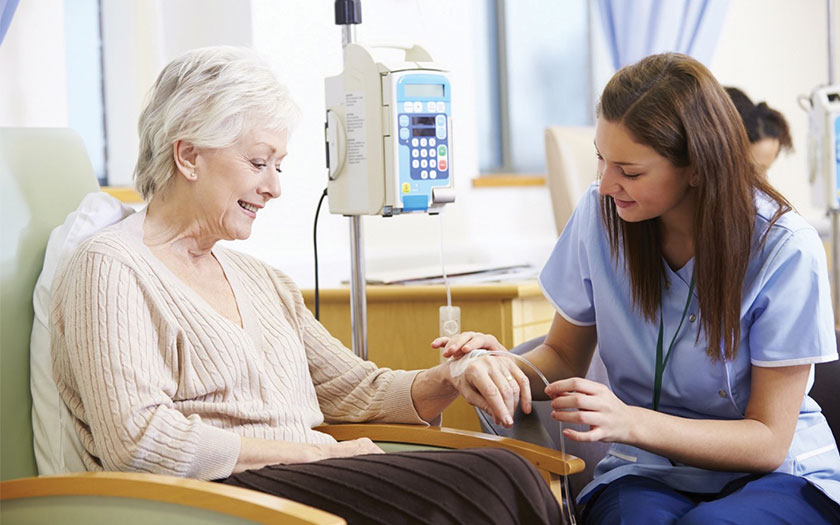Nurses are amazing human beings and they sacrifice so much of their time to care for others in need. Did you know, however, that as angelic as they seem to be towards us at the hospitals, they too have their fair share of struggles and also, there are many things nurses wish we knew! Here are some of them.
1. You really shouldn’t have waited this long
I’d never tell a patient that he was stupid for waiting a week for his stroke symptoms to improve before coming to the hospital. Although I’d like to. Especially if his wife then complains that we’re not doing anything for the guy. — A longtime nurse who blogs at head-nurse.blogspot.com.
2. Please don’t lie about your pain
If you’re happily texting and laughing with your friends until the second you spot me walking into your room, I’m not going to believe that your pain is a ten out of ten. —A nurse in New York City.
3. Your life may be literally in our hands, you know
We question physicians’ orders more often than you might think. Some of the mistakes I’ve headed off: a physician who forgot to order a medication that the patient was taking at home, a doctor who ordered the incorrect diet for a diabetic, and one who tried to perform a treatment on the wrong patient. —A nurse from Pennsylvania.
4. The one thing you should never say to me
“You’re too smart to be a nurse.” I went to nursing school because I wanted to be a nurse, not because I wanted to be a doctor and didn’t make it.” —A longtime nurse in Texas.
5. Don’t leave out anything when the doctor asks you what meds you took
When your provider asks for a list of the medications you’re taking, make sure you include over-the-counter drugs and herbals. People think that if an herb is ‘all natural’ and ‘organic,’ it’s not a medication. But that’s not true. Herbals can interact with other medications and can cause serious complications. —Kristin Baird, RN, president and CEO of the Baird Group in Fort Atkinson, WI.
6. Stop asking me about your test results
If you ask me if your biopsy results have come back yet, I may say no even if they have, because the doctor is really the best person to tell you. He can answer all your questions.— Gina, a longtime nurse.
7. A positive note from you can go a long way
If you have a really great nurse, a note to her nurse manager that says ‘So-and-so was exceptional for this reason’ will go a long way. Those things come out in her evaluation—it’s huge. —Linda Bell, RN.
8. We still believe in miracles
I once took care of a child who had been in a coma for more than a week. The odds that he would wake up were declining, but I had read that the sense of smell was the last thing to go. So I told his mom, ‘Put your perfume on a diaper and hold it up by his nose to see if it will trigger something.’ The child woke up three hours later. It was probably a coincidence, but it was one of my best moments as a nurse. —Barb Dehn, RN, NP, a nurse practitioner in Silicon Valley, CA who blogs at nursebarb.com.
9. It’s a demanding occupation
Some jobs are physically demanding. Some are mentally demanding. Some are emotionally demanding. Nursing is all three. If you have a problem with a nurse or with your care, ask to speak to the charge nurse [the one who oversees the shift]. If it isn’t resolved at that level, ask for the hospital supervisor.—Nancy Brown, RN, a longtime nurse in Seattle, WA.
10. Nurses shouldn’t miss your vein
If the person drawing your blood misses your vein the first time, ask for someone else. I’ve seen one person stick someone three times. They need to practice, but it shouldn’t be on you! —Karon White Gibson, RN, producer-host of Outspoken with Karon, a Chicago cable TV show.
11. Don’t let your pain get out of control
Using a scale of zero to ten, with ten being the worst pain you can imagine, start asking for medication when your pain gets to a four. If you let it get really bad, it’s more difficult to get it under control. —Nancy Beck, RN, a nurse at a Missouri hospital.
12. Don’t hold your breath before a painful procedure
Don’t hold your breath when you know we’re about to do something painful, like remove a tube or take the staples out of an incision. Doing that will just make it worse. Take a few deep breaths instead. —Mary Pat Aust, RN.
13. Ask anyone who comes into your room if they’ve washed their hands
There are staff at every hospital who just don’t think that they need to wash their hands between seeing patients. Others get distracted and forget. So always ask anyone who comes into your room, ‘Have you washed your hands? —Kathy Stephens Williams, RN.
14. Please give physical affection to dying loved ones
When you’re with someone who is dying, try to get in bed and snuggle with them. Often they feel very alone and just want to be touched. Many times my patients will tell me, ‘I’m living with cancer but dying from lack of affection. —Barb Dehn, RN, NP.
15. We save as many patients as doctors do!
We’re the ones keeping an eye on your electrolytes, your fluids, whether you’re running a fever. We’re often the ones who decide whether you need a feeding tube or a central line for your IV. And we’re the ones who yell and screech when something goes wrong.” —A longtime nurse in Texas.
16. If you do not understand what the doctor is telling you, say so!
I once heard a doctor telling his patient that the tumor was benign, and the patient thought that benign meant that he had cancer. That patient was my dad. It was one of the things that inspired me to become a nurse.” —Theresa Tomeo, RN, a former nurse at the Beth Abraham Center for Nursing and Rehabilitation in Queens, NY.
17. Know when to draw the line
I had one patient show up repeatedly to see me after he was discharged. Another little old man tried to pull me into bed with him. (He was stronger than he looked.) The general rule is don’t ask us on a date. We’re busy. It’s unethical. And, really, I already know you better than I want to. — A longtime nurse in Texas.
18. Doctors don’t neccasarily talk to each other
You might think that all the doctors who see you talk to each other, but they often don’t. That’s a problem because physicians sometimes disagree. The more you can keep track of different doctors’ opinions—and communicate them—the better off you’ll be. –A nurse in Pennsylvania.
19. If you are (truly) in pain, tell us!
For some reason, when I ask ‘Are you having pain?’ a lot of patients say no, even if they are. But I’ve found that if I say, ‘Are you uncomfortable?’ people are much more likely to say yes. Please tell us if you’re in pain. We have all sorts of medications we can use to help you. –Mary Pat Aust, RN.
20. Your vitals are important
We know you hate being woken up, but we have to check your vital signs every four hours. It’s not the Hilton, it’s a hospital. And that’s hospital policy. –A nurse in St. Petersburg, FL.
21. Bother your nurse!
My biggest piece of advice: Bother the nurse. When I come upon patients who are in a lot of pain, I’ll ask, ‘Why didn’t you ask the nurse for your pain medication?’ and they say, ‘She looked so busy. I didn’t want to bother her.’ Please, ‘bother’ your nurse. She can’t help you if she doesn’t know what you need. –Nurse supervisor at a New Jersey hospital.
22. Let us know about your family
If you think your family member is confused, let us know. That tells us we should move them closer to the nurses’ desk and check in on them more frequently. We’ll also attach an alarm to their gown so we know if they’re getting up without assistance. –Nancy Beck, RN, a nurse at a Missouri hospital.
23. Keep your sick loved one’s comfort in mind
When it comes to very elderly patients, sometimes family members who are afraid of seeing Mom or Dad go will want us to run a lot of tests or do a major surgery—when, really, the elderly patient just wants to be comfortable. If you’re the older patient, be sure your nurse and your doctors know what you want. –Nancy Beck, RN, a nurse at a Missouri hospital.

















